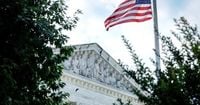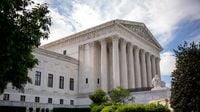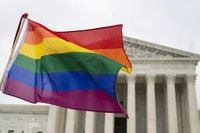On October 7, 2025, the U.S. Supreme Court found itself at the heart of a contentious debate over the boundaries of free speech, the role of professional regulation, and the rights of LGBTQ youth. The case, Chiles v. Salazar, challenges Colorado’s 2019 ban on conversion therapy for minors—a law that has become a flashpoint in the national struggle over LGBTQ protections and religious freedom.
The law in question, the Minor Conversion Therapy Law, was enacted with bipartisan support and prohibits licensed mental health professionals in Colorado from engaging in any practice, including talk therapy, that attempts to change a minor’s sexual orientation or gender identity. Violators face fines up to $5,000 and the potential loss or suspension of their professional license. Colorado is among more than twenty states that have instituted similar bans, a trend that has swept through both progressive and conservative legislatures in recent years.
Kaley Chiles, a Christian counselor from Colorado Springs, is at the center of the legal battle. She argues that the state’s ban unconstitutionally censors conversations about gender dysphoria and sexual orientation that she wants to have with young clients. “I help people who come to see me have conversations to clarify what their goals and their values are and to identify the ways in which they would like to live a life that is more fulfilling and more satisfying and more in line with who God created them to be,” Chiles explained in an online video about her case, as reported by CPR News. While Chiles has never been sanctioned by the state for breaking its ban, she says the law has led her to self-censor and is preventing her from living out her Christian beliefs in her daily work.
The conservative legal group Alliance Defending Freedom (ADF) is representing Chiles. According to CPR News, ADF has a robust record of challenging LGBTQ protections, counting sixteen wins at the Supreme Court since 2011, including its role in overturning Roe v. Wade. ADF senior counsel Jake Warner contends that Colorado’s law “forbids counselors from helping kids regain comfort with their biological sex. And that's viewpoint discrimination and it censors speech in violation of the First Amendment.”
Colorado officials, however, see the issue very differently. Shannon Stevenson, the state’s solicitor general, told the justices that the law regulates treatment, not speech. “We are acting in the way that states have always done to protect our consumers. And the idea that there could be some First Amendment attack on this is unprecedented and dangerous,” Colorado’s Democratic Attorney General Phil Weiser told CPR News. The state argues that the ban is a reasonable regulation of professional conduct, designed to protect minors from practices that major medical organizations have deemed ineffective and potentially harmful.
Indeed, the American Psychiatric Association removed homosexuality from its manual of mental disorders decades ago, and a United Nations report recently concluded that conversion therapy "can amount to torture" and called for a global ban. Colorado’s law is supported by a broad consensus in the medical and psychological community, which considers efforts to change a person’s sexual orientation or gender identity not only unsupported by science but also associated with increased risks of depression, anxiety, and suicidality. “What was missing is the data that it doesn't work, and the data that it can actually cause serious mental health issues for people who go through that,” said Brad Reubendale, a Denver resident who underwent conversion therapy as a teenager and later became an advocate for banning the practice, as recounted in CPR News.
The Supreme Court justices pressed both sides with pointed questions. Justice Neil Gorsuch described Colorado’s interpretation of its own law as “peculiar,” while Justice Samuel Alito questioned how the state could reconcile its reading with the law’s plain language. The heart of the dispute is whether the ban regulates professional conduct—a domain where the state has broad authority—or whether it targets speech, which receives heightened protection under the First Amendment.
Jim Campbell, arguing on behalf of Chiles, maintained that the law transforms therapists into “mouthpieces for the government.” He asserted that the ban forbids licensed counselors from helping minors pursue “state disfavored goals” on issues of gender and sexuality, while permitting support for those undergoing gender transition. “The Free Speech Clause forbids the State from censoring mutual conversations on important topics. This includes discussions between counselors and clients on deeply personal issues,” lawyers with ADF wrote in filings, according to CBS News.
State officials, meanwhile, emphasized the longstanding tradition of regulating health care to protect patients. Stevenson argued that therapists have a fiduciary duty to shield clients from substandard care and that the First Amendment has never barred states from policing harmful professional practices. “At no time has the First Amendment been understood to confer on professionals a constitutional right to use words to deliver treatment that violates the standard of care,” Colorado lawyers argued.
The Trump administration has weighed in on Chiles’ side, filing a brief urging the Supreme Court to send the case back to lower courts for further review. “Colorado is muzzling one side of an ongoing debate in the mental-health community about how to discuss questions of gender and sexuality with children,” Solicitor General D. John Sauer wrote, as cited by CBS News. Some justices, including Amy Coney Barrett and Ketanji Brown Jackson, floated the idea of remanding the case to lower courts to review the law under strict scrutiny, the most demanding level of judicial review.
For families and advocates on both sides, the stakes are enormous. Supporters of the ban argue that overturning it would endanger vulnerable LGBTQ youth nationwide. “The worst thing that could happen is for the court to view these laws through some sort of current politicized lens. We're all so divided now. There's such a toxic political environment, especially there's so much anti-LGBT sentiment being voiced now,” said Shannon Minter, legal director for the National Center for LGBTQ Rights, according to CPR News. On the other hand, those challenging the law insist that individuals seeking to align their identity with their religious beliefs should have access to professional counseling that supports that goal. “Many people believe that they were born male or female, that these are unchangeable biological realities,” said Jordan Lorence, an attorney with First Liberty Institute. “This is a legitimate point of view that people can live consistently with, and counselors should be there to help them live that way.”
Colorado’s law, it’s worth noting, applies only to licensed professionals. Families are still free to seek informal counseling through religious or personal channels, a compromise that disappointed some advocates but was intended to avoid a direct clash with the First Amendment.
As the Supreme Court deliberates, the country waits for a decision that could reshape the landscape for LGBTQ youth, mental health professionals, and the ongoing debate over the limits of state power and free speech. A ruling is expected by late June or early July 2026. For those watching closely, the outcome will be more than just a legal precedent—it will be a signal of how the nation balances the rights of vulnerable youth, the authority of the state, and the freedoms enshrined in the Constitution.






